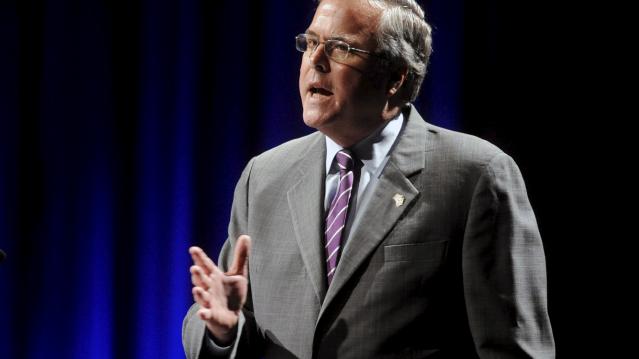Jeb Bush Wants Me to Do More What?

Yesterday, Republican hopeful Jeb Bush ticked off hard-working Americans everywhere when he said that in order to grow the economy, people had to work longer hours. Here’s the skinny:
What He Said: “My aspiration for the country--and I believe we can achieve it--is 4 percent growth as far as the eye can see. Which means we have to be a lot more productive. Workforce participation has to rise from its all-time modern lows. It means that people need to work longer hours and, through their productivity, gain more income for their families. That’s the only way we’re going to get out of this rut that we’re in.”
This Is All We Heard: “People need to work longer hours.” And “Let them eat cake.” Then we played Hall & Oates “Out of Touch” a few times.
Related: Microsoft Hangs Up on Nokia, Cuts 7,800 Jobs
Then He Talked Some More. Later Bush clarified that his remarks really were in reference to underemployment and part-time workers. His campaign cited stark statistics of falling workforce participation, which are currently at their lowest level since October 1977. It also was a dig at Obamacare, which had previously defined the work week for a full-time employee at 30 hours, causing many employers to cap work weeks at 29 hours.
Who’s right? Well, as it turns out, both are. Workforce participation in the U.S. is at 62.6 percent. The Bureau of Labor says there are 6.5 million people in the U.S. who are working part-time because they can’t find full-time employment.
But it’s also true that many Americans are already putting in longer hours, and taking fewer and shorter vacations. A recent Time cover story called out, “Save the American Vacation” and referred to us as a “no-vacation nation.” A 2014 Gallup poll claims the average work week for many Americans who work full-time is more like 47 hours (not 40), and 21 percent report they work between 50 to 59 hours per week. Another 18 percent said they work 60 hours or more. (Only the South Koreans work harder, but we really don’t want to emulate them.)
That didn’t stop Democratic rivals from hollering back. Presidential candidate Hillary Clinton Tweeted: “Anyone who believes Americans aren’t working hard enough hasn’t met enough American workers.”
So there—for now.
Stat of the Day: 0.2%

The New York Times’ Jim Tankersley tweets: “In order to raise enough revenue to start paying down the debt, Trump would need tariffs to be ~4% of GDP. They're currently 0.2%.”
Read Tankersley’s full breakdown of why tariffs won’t come close to eliminating the deficit or paying down the national debt here.
Number of the Day: 44%

The “short-term” health plans the Trump administration is promoting as low-cost alternatives to Obamacare aren’t bound by the Affordable Care Act’s requirement to spend a substantial majority of their premium revenues on medical care. UnitedHealth is the largest seller of short-term plans, according to Axios, which provided this interesting detail on just how profitable this type of insurance can be: “United’s short-term plans paid out 44% of their premium revenues last year for medical care. ACA plans have to pay out at least 80%.”
Number of the Day: 4,229

The Washington Post’s Fact Checkers on Wednesday updated their database of false and misleading claims made by President Trump: “As of day 558, he’s made 4,229 Trumpian claims — an increase of 978 in just two months.”
The tally, which works out to an average of almost 7.6 false or misleading claims a day, includes 432 problematics statements on trade and 336 claims on taxes. “Eighty-eight times, he has made the false assertion that he passed the biggest tax cut in U.S. history,” the Post says.
Number of the Day: $3 Billion

A new analysis by the Department of Health and Human Services finds that Medicare’s prescription drug program could have saved almost $3 billion in 2016 if pharmacies dispensed generic drugs instead of their brand-name counterparts, Axios reports. “But the savings total is inflated a bit, which HHS admits, because it doesn’t include rebates that brand-name drug makers give to [pharmacy benefit managers] and health plans — and PBMs are known to play games with generic drugs to juice their profits.”
Chart of the Day: Public Spending on Job Programs

President Trump announced on Thursday the creation of a National Council for the American Worker, charged with developing “a national strategy for training and retraining workers for high-demand industries,” his daughter Ivanka wrote in The Wall Street Journal. A report from the president’s National Council on Economic Advisers earlier this week made it clear that the U.S. currently spends less public money on job programs than many other developed countries.

